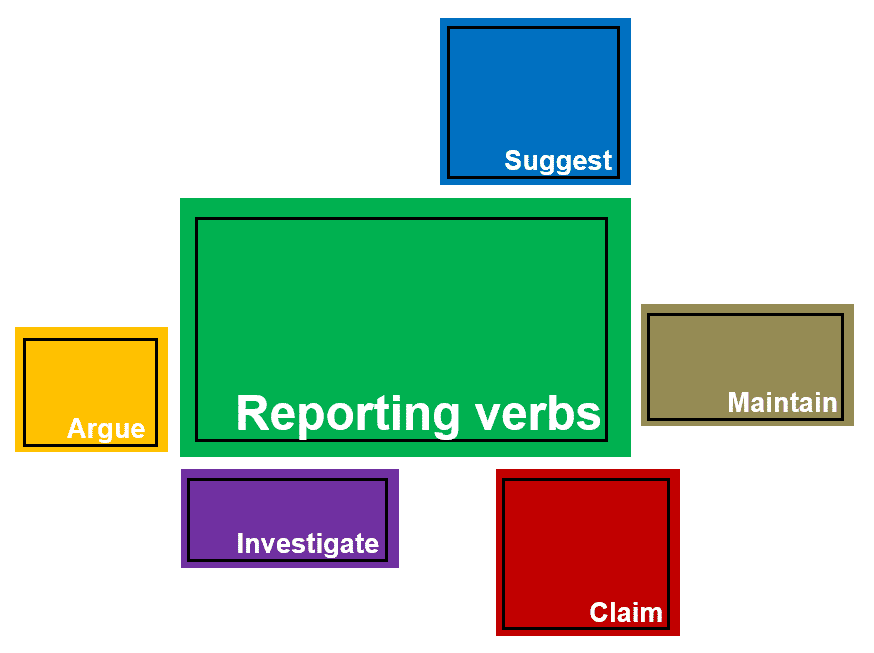In academic writing, you will often need to refer to the research of others, also called secondary sources. A reporting verb is a word which is used to talk about or report on other people’s work. Reporting verbs can be used to great effect, but the difficulty with using them is that there are many, and each of them has a slightly different and often subtle meaning.
Purpose of Reporting Verbs
In academic writing, it is important to present an argument logically and cohesively. You may be required to:
- comment on someone’s work
- agree or disagree with someone else’s study
- evaluate someone’s ideas
Often you will be assessed on your ability to demonstrate these skills. It is repetitive and boring to write ‘Smith says…’ over and over again. Fortunately, there is a wide choice of reporting verbs in English. Reporting verbs can indicate:
- the author’s personal viewpoint
- your viewpoint regarding what the author says
- the author’s viewpoint regarding other literature.
To interpret the writer’s ideas accurately, however, you will need to use a verb with the correct nuance (sense of meaning). Use an English learner’s dictionary to check that you have the right verb for the right context.
Function and strength of reporting verbs Some verbs are weaker in their function, while others are strong. Some verbs are followed by a preposition (e.g. as, to, for, with, of), while others are followed by a noun or ‘that’ (see page 3). In addition, some verbs can fit more than one category e.g. warns can be used to disagree with, emphasise or examine an idea.
Advanced ways to show your attitude Reporting verbs are a way for you, the writer, to show your attitude towards the source of information you are citing. These attitudes are either ‘positive’, ‘negative’ or ‘neutral’.
Do you agree with what the author has said? If so, use reporting verbs with a positive meaning to them. Here are some reporting verbs that tend to be positive:
acknowledges affirms analyses applauds argues contends explains identifies observes persuades proves supports
Do you disagree with what the author has said? In this case, you can use a negative reporting verb to indicate this. Here are some reporting verbs used when there is a belief that the literature is incorrect.
accuses alleges apologises asserts comments confuses doubts guesses hopes intimates questions speculates
Perhaps you don’t feel positive or negative about the source you are citing. In this situation, you should use a neutral reporting verb. Here are some reporting verbs that tend to be neutral:
accepts acknowledges adds agrees assures claims concludes confirms describes expresses maintains recognises reports says thinks Keep in mind that there are many more reporting verbs you can use to more fully express how you feel about the sources you are using in your essays and papers.
Reporting Verbs and Your Writer’s Voice
Academic writing at university normally requires you to use multiple information sources, and to evaluate the quality of their ideas. One important tool for doing this is reporting verbs.
Reporting verbs tell us that someone said something. However, careful selection of reporting verbs can help show your assessment of the quality of what they have said. This is a vital academic skill. It not only helps turn ordinary Pass-level work into much better work, but it also develops your critical thinking skills.
Reporting verbs can show your opinion of others’ ideas:
- a belief that the literature is correct (stronger position)
- a neutral attitude towards the veracity of the literature (i.e. neither correct nor incorrect – neutral position)
- a belief that the literature is incorrect (weaker position)
The grammar of reporting verbs
Reporting verbs have simple basic grammar. However, it can be confusing because there are two basic patterns. Some reporting verbs belong to one pattern, some to the other, and some to both.
Pattern 1: Verb + Noun (noun phrase)
The authors show the devastating results of this policy (Smith & Jones 2008, p. 12).
Gillard (2012) indicated her negative opinion of Abbott’s proposal.
Pinker (2002) frequently approves of Chomsky’s theories.
Pattern 2: Verb + That + clause (i.e. sentence)
The authors show that this policy had devastating results (Smith & Jones 2008, p. 12).
Gillard (2012) indicated that Abbott’s proposal was untenable in her opinion.




